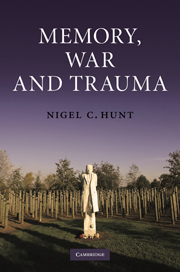Book contents
- Frontmatter
- Contents
- Preface
- 1 Background and purpose
- 2 Historical perspective
- 3 Methods and ethics
- 4 Current theory: post-traumatic stress disorder
- 5 Approaches to understanding trauma
- 6 Positive outcomes of traumatic experiences
- 7 Memory and history
- 8 Personal narrative and social discourse
- 9 Illustrating narrative as a scientific technique: the role of social support
- 10 Ageing, trauma and memory
- 11 Literature and trauma
- 12 Memorialisation and commemoration
- 13 Battlefield tours
- 14 Conclusions and future directions
- References
- Index
3 - Methods and ethics
Published online by Cambridge University Press: 05 June 2012
- Frontmatter
- Contents
- Preface
- 1 Background and purpose
- 2 Historical perspective
- 3 Methods and ethics
- 4 Current theory: post-traumatic stress disorder
- 5 Approaches to understanding trauma
- 6 Positive outcomes of traumatic experiences
- 7 Memory and history
- 8 Personal narrative and social discourse
- 9 Illustrating narrative as a scientific technique: the role of social support
- 10 Ageing, trauma and memory
- 11 Literature and trauma
- 12 Memorialisation and commemoration
- 13 Battlefield tours
- 14 Conclusions and future directions
- References
- Index
Summary
Trying to understand and treat war trauma requires a good practical and theoretical understanding of the subject. In order to obtain such an understanding, effective methods must be used. Within psychology we have developed a whole range of methods, from experimental through to qualitative approaches; all can provide us with good theory, but in order to do so they must be used appropriately. As in all science, there is good and less good practice. It is not just that some methods are applied inappropriately, with our ever-advancing technological and methodological understanding; researchers are constantly at the forefront of new techniques and approaches, so it is inevitable that there will be problems along the way. Another difficulty faced by trauma researchers is that the work is often carried out in difficult circumstances, so compromises with regard to method are often made. It is difficult to design the ideal experiment in a battlefield situation.
Another area of importance is that of ethics. While psychologists have broadly conformed to ever more sophisticated ethical codes and procedures over the last few decades, particularly in the West, there is an ongoing debate about ethics, both in the protection of participants and in ensuring the safety of researchers themselves. Ethical issues play an important part in war trauma research. Inevitably, this research involves some danger to both participants and researchers, and there are no clear boundaries between what is acceptable and what is not acceptable.
Information
- Type
- Chapter
- Information
- Memory, War and Trauma , pp. 28 - 49Publisher: Cambridge University PressPrint publication year: 2010
